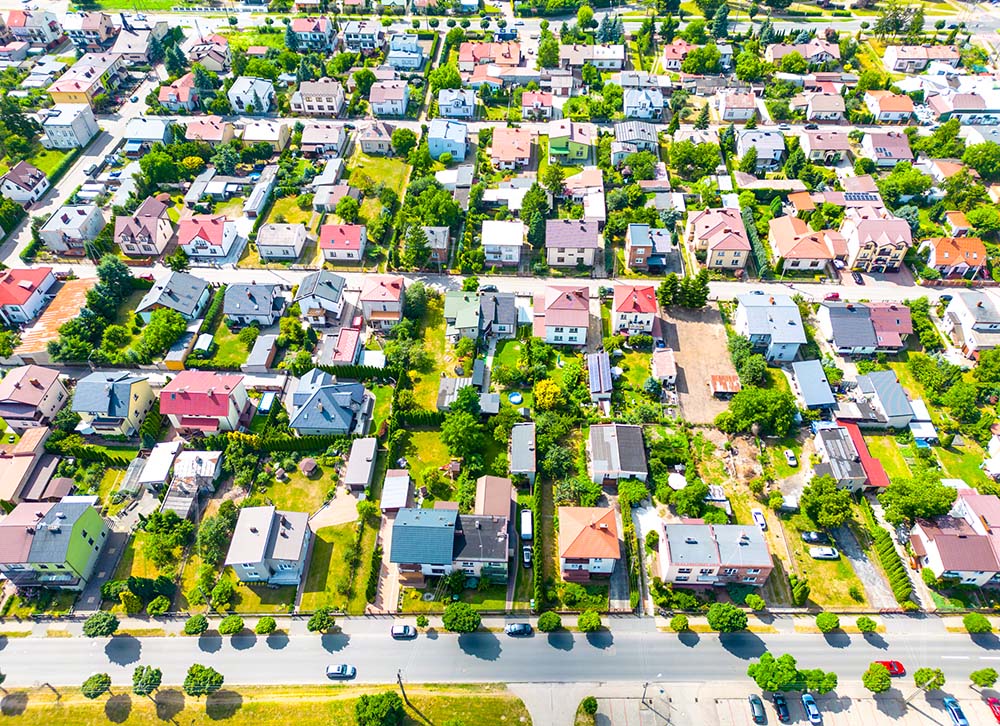
(Dreamstime/Jacek Dudzinski)
Last week in a 10-minute video released by the Harris/Walz campaign in which Vice President Kamala Harris and Minnesota Gov. Tim Walz sat around a table telling each other stories of their lives, Walz said of the present moment, "It almost feels like everybody's coming out of their house after a blizzard. ... You shovel out, and then you start talking to your neighbors."
He also pointed out how in talking about "the promise of America," Harris keeps saying, "Take care of your neighbor."
Over the course of Walz's first few weeks as the Democratic vice presidential candidate — he'll be formally nominated at the party's convention tonight — it's been striking to see just how much the idea of being a good neighbor has been mentioned.
Millions of memes have cropped up pretty much overnight kidding about the neighborly kinds of things that Tim Walz will do for you. He's the guy who mows your lawn while you're away without being asked, or calls you because he's got an extra Springsteen ticket, and then will not hear of having you pay for it, insisting, "Hey, it was just going to go to waste." An entire website, Tim Walz Fixed Your Bicycle, has popped up to create new such memes. (When I clicked on it today, I got, "Tim Walz can show you how to tighten that nut properly.")
'When you're looking in the face of a stranger,' Harris told Walz in their conversation online, 'you should see a neighbor.'
While Walz has a number of other appealing — and one might think more important — qualifications, what seems to be most exciting people about him and the campaign is this notion of the good neighbor.
"When you're looking in the face of a stranger," Harris told Walz in their conversation online, "you should see a neighbor."
No matter where we might each stand politically as Catholics, the idea that the 2024 presidential campaign may in part be fought over concerns for one's neighbor should excite us. Love for one's neighbor — and love understood in a very specific, active way — lies at the foundation of our ethics.
When ancient Israel conceived of the commandments it believed to be essential for the flourishing of its society and its relationship with God, half of the laws it came up with concerned the relationship between a person and their neighbors. It was wrong to take someone's life, their property, their partner, their good name — even, and perhaps most strikingly, to be jealous of them. For society truly to thrive, it wasn't enough for its members not to mistreat one another. They also had to be OK with one another's successes — a disposition that we all know is not easy to maintain.
In the earliest written Gospel, the Gospel of Mark, when Jesus is asked what is the most important commandment, he lists two: "Love the Lord your God with all your heart and with all your soul and with all your mind and with all your strength," and "Love your neighbor as yourself."
Advertisement
Both are actually quotes from the Old Testament. And in that context, "love" is not understood as an emotional response to another. It's not about how we feel. It's about the deeds we do. To love God or love one's neighbor is to do good things for them. So Jesus spends his time reaching out to those in need, the sick, the shunned, the grieving, the sinners, and helping them, even when doing so puts him at risk.
It's much the same today with Pope Francis. While he has spoken and written eloquently on so many important issues facing our world, if you ask most Catholics about the pope you're likely to hear a story of something concrete that he did for someone in need — visiting local prisons on Holy Thursday to wash the feet of the women and men there; going out of his way to bless children, the elderly, or the sick at public events; speaking out on behalf of queer people; creating a shelter for the homeless at a Vatican-owned palace.
At a time when American society is facing serious domestic issues regarding immigration, poverty, climate change, housing prices and inflation, as well as crises in the Middle East and elsewhere, to focus conversation on being a good neighbor may seem pretty slight. No one has ever saved the world by agreeing to drive a friend to the airport, pulling the car around when it's raining, or "loving people when they are excited about their lightsaber technique" (another great line from Tim Walz Fixed Your Bicycle).
But on the other hand, most of us do know what it feels like when a neighbor drops by a casserole or hotdish when we're grieving, when a schoolteacher takes the time to call us on the weekend because they're concerned about our kid, or when a stranger stops to direct us when we're lost in an unfamiliar place.
The idea that the conversation could be led in part by a desire to celebrate and encourage the endless simple acts of generosity out of which our society and our lives are woven sounds pretty wonderful.
To this day, I can remember how much it helped me to have a nurse put her hand on my shoulder while I was having a small surgery; to have a friend from Hawaii send me some delicious Hawaiian cookies and nuts during the pandemic; or to have college friends drive down from Chicago to Milwaukee to come to my sister's funeral. Those people might not have saved the whole world, but in those moments they certainly made my world, our worlds brighter, more bearable, better.
It's funny, the more I go back to the Tim Walz good deed generator, the more touching it seems to become. "Tim Walz will take the training wheels off your bike when you're ready." "Tim Walz will go record shopping with you." "Tim Walz is happy to use your pronouns." "Tim Walz believes you."
And at the end of the day, I don't think that's first and foremost because Walz is a nice guy or a good neighbor, but because so many others have been, and God most of all.
Who knows how the 2024 election campaign will roll out, or what will end up being its key themes. But after decades of growing polarization and mutual demonization in our politics and communities, the idea that the conversation could be led in part by a desire to celebrate and encourage the endless simple acts of generosity out of which our society and our lives are woven sounds pretty wonderful.
Like coming home from a very rough day to find the older lady down the block had left you an apple pie, just because they were thinking of you.








